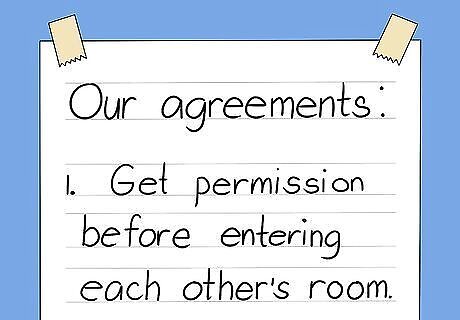
views
Steps

Ask yourself why your sibling is behaving this way Are they lonely? Maybe they just want to play. In that, are they trying to get your attention case, offer to spend more time with them. and don't know how to express it, especially if they're young? Try sharing a few things within your comfort zone. You can devote a bin in your room to things they are allowed to touch (and that are age appropriate). Let them know what the box is for, you might say: "Layla, I would like you to stay away from my action figures, but you can play with the coloring books and Barbie dolls".

Ask them. The only way to know what your sibling is feeling is to ask them. Put some time aside to have a private conversation with your sibling about what is driving them to invade your privacy. Be calm and cordial. Let them know that what they're doing is a breach of trust in a calm, respectful manner. Don't make it seem like they're in trouble. Avoid being condescending.

Tell them nicely but seriously that you need to be alone, and thank them as they leave. Be kind. Don’t push your siblings out of your room or slam the door in their faces. Your siblings are more likely to be respectful to you if you’re respectful to them. Try saying, “I like spending time with you, but I have to study right now, okay?” Try talking to your sibling if they are old enough to understand. A helpful conversation may be enough to fix the issue. Ask them directly to stay away from your belongings, but be polite and don't be demanding or condescending. For example, you might say to your sibling: "Andrew, I've noticed that you've been in my room when I'm not around and I don't like it". Tell them why it makes you upset rather shaming them. You could say to your sister: "Elsie, I like playing with you, but I would really appreciate it if you didn't mess up my backpack because it takes me longer to get ready". You get more flies with honey than vinegar. Be kind and your siblings will be more likely to cooperate.

Try to reach a compromise. Consider your sibling’s point of view. Breathe calmly and listen to what your sibling says. Think about what you can do to get along better. You won’t have to worry about the stuff in your room if you and your siblings can reach a peaceful agreement. For example, don’t assume your siblings are trying to annoy you on purpose. They might be lonely or just bored. You could say, “I’ll hang out with you in one hour if you let me be alone now.”

Come to a mutual agreement. If you want to effectively keep your sibling off of your turf, establish a contract or mutual agreement. Get together with your sibling and talk about privacy if they're old enough. Let them know what you would like in the agreement and encourage them to add points as well. Make the agreement mutual, meaning both parties uphold the contact. For example, you might agree to stay out of their room if they promise do the same. Print the contract, sign it, and keep it in a prominent place so that you both know what is expected.

Spend more time with your siblings. Despite how annoying they can be, they may only be looking for your attention. Play with them, and don’t exclude them from every activity. They might bother you if they’re feeling neglected. Find a hobby that you and your siblings enjoy. For example, if you and your siblings like playing board games, you can make a plan to play board games together every Sunday afternoon. Ask your parents if you can join a hobby class with your siblings. For example, you can attend a crafting or pottery class with your siblings. Having familiar people around when you’re starting something new with a group of strangers can help you and your siblings to bond.

Keep a box of things in your room that your siblings are allowed to use. This will encourage them to play with only what you allow them to. Consider changing some of the items in it once a week or so. Tell them that they have to clean up after themselves whenever they use it, or you won’t add new items to the bin.

Talk with your parents. If talking to your siblings directly doesn’t help, try discussing it with your parents when your siblings aren’t around. If you’re having a real problem with your sibling taking your things, for example, your parents may want to know about it. You can ask your parents if you could have a lock on your bedroom doorknob. Try saying, “Could you give me some ideas on how to get my siblings to respect my privacy?” Try asking, “Can you make a ‘knock first’ policy?” If your parents agree to a knock first policy, and your siblings forget, give them gentle reminders.

Get your parents actively involved. Ask your parents to have a conversation with you and your siblings first separately, and then all together as a family. Tell your parents exactly what your siblings are doing that really bothers you. Family meetings can help everyone feel heard and understood. Ask your parents if you can all come up with some family rules about boundaries during your family meeting. Encourage your parents to enforce those rules if there are times your siblings aren’t following them. Go to your parents if talking to your sibling doesn't work or if their behavior is destructive or repetitive. Be mature and act like an adult instead of whining. They'll be more likely to listen to you. Ask them to talk to your sibling if you cannot do it yourself.

Hide your personal belongings you don't want your sibling gaining access to. Whether it's your diary, your homework, or valuables, find a place to hide personal belongings you don't want your sibling to touch. If your sibling is young, putting these objects out of reach may be enough to deter them Avoid putting these items in common places or those accessible to younger siblings. Avoid sock drawers, pillow cases, or other common hiding places. Try hiding your diary in the pocket of your robe, or putting your action figures behind your bookshelf.
Protecting Your Privacy

Work on solutions with your siblings directly. If you were just fighting, have a cool-down period first. Then, if your siblings are old enough to understand this concept, suggest that you make a list of solutions together that you will both agree to. For example, agree to get permission before entering each other’s rooms. List which situations would make it okay for your sibling to enter your room without asking first. For instance, if your sibling is following the family pet. An example of a rule is, “If I’m with friends, don’t come in.”

Protect your diary. In order to prevent your siblings from reading your secrets, place a lock on your journal. You can wear the key to it around your neck on a necklace, or hide it somewhere in your room. If your diary is on the computer, for example in a Word document, password protect it. For example, you can hide your diary key under your mattress. Don’t hide the key anywhere it could be accidentally washed with the laundry, like in a pillow case or pants pocket.

Hide your prized belongings. Store your favorite, valuable, or breakable items in a locked chest underneath your bed or in a closet. You could also use a cupboard with a lock to put your personal items in. If your siblings are shorter than you, hide your belongings in the closet on a high shelf so that it is out of their reach. Just be careful that you don’t drop it on yourself when you’re taking it back down! For example, a filing cabinet with drawers that lock can be bought online or at an office supply store.

Make a good hiding place. If you don't have any good hiding places in your bedroom, make some! Hollow out an old book to hide a diary or candy. Your little brother is unlikely to take interest in one of your school textbooks. Remove some of the dirt under a fake plant. Hide your good action figures there and stack the plant on top. You can also make a small incision in a tennis ball. When you squeeze the ball, the opening will be big enough to fit something through, but it will look normal sitting on your shelf

Lock your room. Ask your parents for permission to lock your room when you're not around. Make sure that they know your reasons. Before you try this method, ask your parents for permission. Make sure that both your parents and you have a spare key so you don't end up locking yourself out. This is the most effective way to keep your siblings away from your things Put your key somewhere that you'll remember, but your sibling doesn't have access to. Keep it in a secret pocket in your backpack, or hang it around your neck.




















Comments
0 comment